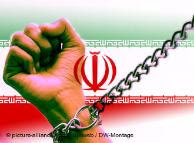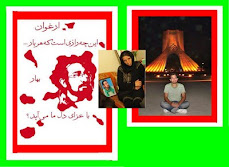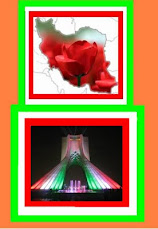اشتراک در:
نظرات پیام (Atom)
skip to main |
skip to sidebar









صفحات
حکومت فاشيستي ، چکمه های پاسداران جلاد!

مبارزه تا رهائي ميهن در زنجيرمان!

مبارزه تا رهائي ميهن در زنجيرمان!

مبارزه تا رهائي ميهن در زنجيرمان!

مبارزه تا رهائي ميهن در زنجيرمان!

مبارزه تا رهائي ميهن در زنجيرمان!
مبارزه تا رهائي ميهن در زنجيرمان!
نه سازش، نه تسليم، نبرد با ارتجاع!

NEDA/ NEDA

بايگانی وبلاگ
-
◄
2014
(2326)
-
◄
سپتامبر
(278)
- ◄ سپتامبر 30 (1)
- ◄ سپتامبر 29 (7)
- ◄ سپتامبر 27 (10)
- ◄ سپتامبر 26 (6)
- ◄ سپتامبر 25 (4)
- ◄ سپتامبر 24 (6)
- ◄ سپتامبر 23 (18)
- ◄ سپتامبر 22 (12)
- ◄ سپتامبر 21 (2)
- ◄ سپتامبر 20 (29)
- ◄ سپتامبر 19 (9)
- ◄ سپتامبر 18 (7)
- ◄ سپتامبر 17 (11)
- ◄ سپتامبر 16 (10)
- ◄ سپتامبر 15 (21)
- ◄ سپتامبر 14 (7)
- ◄ سپتامبر 13 (11)
- ◄ سپتامبر 12 (11)
- ◄ سپتامبر 11 (1)
- ◄ سپتامبر 10 (12)
- ◄ سپتامبر 09 (11)
- ◄ سپتامبر 08 (12)
- ◄ سپتامبر 07 (2)
- ◄ سپتامبر 06 (9)
- ◄ سپتامبر 05 (1)
- ◄ سپتامبر 04 (21)
- ◄ سپتامبر 03 (15)
- ◄ سپتامبر 02 (8)
- ◄ سپتامبر 01 (4)
-
◄
سپتامبر
(278)
-
▼
2013
(1716)
-
▼
اکتبر
(307)
-
▼
اکتبر 14
(8)
- کشف تونلی در مسیر غزه به اسرائیل
- ﺍﻧﺘﺸﺎﺭ ﺍﺳﻨﺎﺩ اختصاص ﺑﻮﺭﺳﻴﻪ وزارت علوم به ﻓﺮﺯﻧﺪﺍﻥ ﺻ...
- B'Tselem - The Israeli Information Center for Huma...
- رئیس بانک جهانی: آمریکا فقط چند روز با فاجعه اقتصا...
- کلید حسن روحانی و مک فارلینفرزانه روستایی ...
- رجمه س. حاتملوی:مردم خسته شده اند مصاحبه ی مجله ...
- درباره جریان حاکم بر سازمان مجاهدین خلق ایران ـ ...
- روستای کلپورگان - سیستان وبلوچستان
-
▼
اکتبر 14
(8)
-
◄
سپتامبر
(116)
- ◄ سپتامبر 30 (8)
- ◄ سپتامبر 29 (6)
- ◄ سپتامبر 28 (10)
- ◄ سپتامبر 27 (4)
- ◄ سپتامبر 26 (5)
- ◄ سپتامبر 25 (10)
- ◄ سپتامبر 24 (7)
- ◄ سپتامبر 23 (6)
- ◄ سپتامبر 22 (3)
- ◄ سپتامبر 21 (3)
- ◄ سپتامبر 20 (11)
- ◄ سپتامبر 19 (4)
- ◄ سپتامبر 18 (1)
- ◄ سپتامبر 17 (4)
- ◄ سپتامبر 10 (8)
- ◄ سپتامبر 07 (4)
- ◄ سپتامبر 06 (10)
- ◄ سپتامبر 04 (5)
- ◄ سپتامبر 03 (6)
- ◄ سپتامبر 02 (1)
-
▼
اکتبر
(307)
-
◄
2012
(1008)
-
◄
سپتامبر
(64)
- ◄ سپتامبر 30 (2)
- ◄ سپتامبر 29 (2)
- ◄ سپتامبر 28 (1)
- ◄ سپتامبر 25 (4)
- ◄ سپتامبر 24 (4)
- ◄ سپتامبر 23 (2)
- ◄ سپتامبر 21 (8)
- ◄ سپتامبر 20 (2)
- ◄ سپتامبر 19 (4)
- ◄ سپتامبر 18 (2)
- ◄ سپتامبر 17 (3)
- ◄ سپتامبر 16 (1)
- ◄ سپتامبر 15 (3)
- ◄ سپتامبر 13 (6)
- ◄ سپتامبر 12 (3)
- ◄ سپتامبر 10 (1)
- ◄ سپتامبر 09 (1)
- ◄ سپتامبر 08 (4)
- ◄ سپتامبر 06 (3)
- ◄ سپتامبر 04 (5)
- ◄ سپتامبر 03 (2)
- ◄ سپتامبر 02 (1)
-
◄
سپتامبر
(64)
-
◄
2011
(1700)
-
◄
سپتامبر
(26)
- ◄ سپتامبر 30 (2)
- ◄ سپتامبر 29 (4)
- ◄ سپتامبر 28 (4)
- ◄ سپتامبر 26 (1)
- ◄ سپتامبر 24 (2)
- ◄ سپتامبر 23 (2)
- ◄ سپتامبر 22 (2)
- ◄ سپتامبر 19 (2)
- ◄ سپتامبر 18 (7)
-
◄
سپتامبر
(26)
-
◄
2010
(1611)
-
◄
سپتامبر
(160)
- ◄ سپتامبر 29 (5)
- ◄ سپتامبر 28 (5)
- ◄ سپتامبر 27 (1)
- ◄ سپتامبر 26 (7)
- ◄ سپتامبر 25 (7)
- ◄ سپتامبر 24 (2)
- ◄ سپتامبر 23 (8)
- ◄ سپتامبر 22 (11)
- ◄ سپتامبر 21 (3)
- ◄ سپتامبر 20 (5)
- ◄ سپتامبر 19 (6)
- ◄ سپتامبر 18 (4)
- ◄ سپتامبر 17 (14)
- ◄ سپتامبر 16 (11)
- ◄ سپتامبر 15 (5)
- ◄ سپتامبر 14 (8)
- ◄ سپتامبر 13 (4)
- ◄ سپتامبر 12 (6)
- ◄ سپتامبر 11 (6)
- ◄ سپتامبر 10 (12)
- ◄ سپتامبر 09 (2)
- ◄ سپتامبر 08 (3)
- ◄ سپتامبر 07 (5)
- ◄ سپتامبر 06 (6)
- ◄ سپتامبر 05 (3)
- ◄ سپتامبر 04 (3)
- ◄ سپتامبر 02 (5)
- ◄ سپتامبر 01 (3)
-
◄
سپتامبر
(160)
-
◄
2009
(756)
-
◄
سپتامبر
(87)
- ◄ سپتامبر 29 (7)
- ◄ سپتامبر 28 (2)
- ◄ سپتامبر 27 (2)
- ◄ سپتامبر 26 (1)
- ◄ سپتامبر 25 (3)
- ◄ سپتامبر 24 (5)
- ◄ سپتامبر 23 (2)
- ◄ سپتامبر 21 (9)
- ◄ سپتامبر 19 (2)
- ◄ سپتامبر 18 (5)
- ◄ سپتامبر 17 (4)
- ◄ سپتامبر 16 (9)
- ◄ سپتامبر 15 (3)
- ◄ سپتامبر 12 (1)
- ◄ سپتامبر 11 (1)
- ◄ سپتامبر 10 (3)
- ◄ سپتامبر 09 (2)
- ◄ سپتامبر 08 (7)
- ◄ سپتامبر 07 (3)
- ◄ سپتامبر 06 (1)
- ◄ سپتامبر 05 (1)
- ◄ سپتامبر 04 (4)
- ◄ سپتامبر 03 (3)
- ◄ سپتامبر 02 (6)
- ◄ سپتامبر 01 (1)
-
◄
سپتامبر
(87)
-
◄
2008
(238)
-
◄
سپتامبر
(11)
- ◄ سپتامبر 27 (1)
- ◄ سپتامبر 26 (2)
- ◄ سپتامبر 15 (2)
- ◄ سپتامبر 12 (2)
- ◄ سپتامبر 05 (1)
- ◄ سپتامبر 03 (1)
- ◄ سپتامبر 01 (2)
-
◄
سپتامبر
(11)
هیچ نظری موجود نیست:
ارسال یک نظر